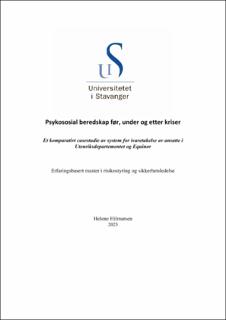| dc.contributor.advisor | Abrahamsen, Eirik Bjorheim | |
| dc.contributor.author | Hilmarsen, Helene | |
| dc.date.accessioned | 2023-12-23T16:51:18Z | |
| dc.date.available | 2023-12-23T16:51:18Z | |
| dc.date.issued | 2023 | |
| dc.identifier | no.uis:inspera:167176609:83577435 | |
| dc.identifier.uri | https://hdl.handle.net/11250/3108843 | |
| dc.description.abstract | I en stadig mer uforutsigbar verden, er det mange ansatte som opplever særlig belastende hendelser og kriser. For at de ansatte skal fungere godt under og etter en krise er det nødvendig at arbeidsgiver har et godt system for psykososial ivaretakelse. Formålet med denne oppgaven er en komparativ analyse av systemene for psykososial beredskap i henholdsvis Utenriksdepartementet og Equinor. Hensikten er å skape innsikt i temaet og å undersøke om det er noe de kan lære av hverandre. På bakgrunn av dette er følgende problemstilling valgt:
Finnes det områder i systemene for ivaretakelse av ansatte før, under og etter en krise hvor Utenriksdepartementet og Equinor kan lære av hverandre?
For å kartlegge systemene til organisasjonene og tidligere forskning på temaet ble datainnsamlingen gjennomført som en kombinasjon av litteraturstudier og intervju med nøkkelpersoner i organisasjonene.
Funnene viser at i Utenriksdepartementet er det mange ulike aktører og tiltak som til sammen kan defineres som et system. Det finnes ingen psykososial beredskapsplan og systemet kan derfor beskrives som reaktivt og noe ad hoc.
I Equinor er det et helhetlig system for psykososial beredskap. De har et grundig planverk og har fokus på forebygging. Systemet kan beskrives som proaktivt og profesjonelt.
Konklusjonen på problemstillingen er at det er flere områder i systemene for ivaretakelse av ansatte før, under og etter en krise hvor organisasjonene kan lære av hverandre:
1. Planverk og prosedyrer
2. Trening og øving på psykososial ivaretakelse
3. HEAT-kurs for ansatte som skal operere i risikoutsatte områder
4. Kompetanse på psykososial førstehjelp
5. Ansvar for ivaretakelsen av ansatte
6. Kameratstøtte
7. Læring
8. Konkrete holdepunkter for oppfølging
9. Intern informasjonsdeling og kommunikasjon
10. Bør psykososial oppfølging i etterkant av kriser være frivillig? | |
| dc.description.abstract | In an increasingly unpredictable world, many employees experience particularly stressful events and crises. It is necessary for employers to have a good system for psychosocial care to ensure that employees have the best possible conditions to function well and master their job in a crisis. This thesis is a comparative analysis of the systems for psychosocial preparedness in the Norwegian Ministry of Foreign Affairs (MFA) and Equinor. The purpose is to create an insight into the topic and find out if there is anything the organizations can learn from each other. The problem to be addressed in this thesis is:
Are there any areas in the systems for psychosocial care of employees before, under and after a crisis where the Ministry of Foreign Affairs and Equinor can learn from each other?
To map the systems of the organizations and research done on the topic, the collection of data was carried out as a combination of literature studies and interviews with key persons in the two organizations.
The discussion shows that the MFA has many different actors and measures that together can be described as a system. There is no psychosocial preparedness plan, and the system can thus be described as reactive and a bit ad hoc.
Equinor is shown to have a holistic system for psychosocial preparedness. They have a thorough plan and focus on prevention. The system can be described as proactive and professional.
The conclusion to the addressed problem is that there are several areas in the systems for psychosocial care before, under and after a crisis where the organizations can learn from each other:
1. Plan and procedures
2. Training on psychosocial care
3. HEAT-course for employees working in risk-prone areas
4. Competency on psychosocial first aid
5. Responsibility for care of employees
6. Peer support
7. Learning
8. Concrete points of reference for follow-up
9. Internal information sharing and communication
10. Should psychosocial follow-up after a crisis be voluntary? | |
| dc.language | nob | |
| dc.publisher | uis | |
| dc.title | Psykososial beredskap før, under og etter kriser
- Et komparativt casestudie av system for ivaretakelse av ansatte i Utenriksdepartementet og Equinor | |
| dc.type | Master thesis | |
